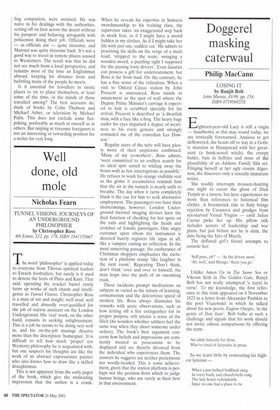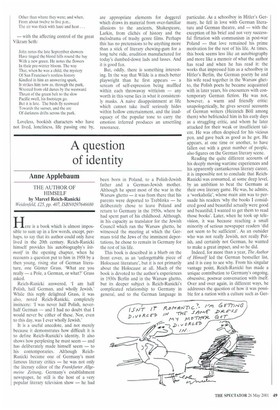Doggerel masking caterwaul
Philip MacCann
LOSING IT by Ranjit Bolt John Murray, £9.99, pp. 154, ISBN 071956025X Eighteen-year-old Lucy is still a virgin -inauthentic as this may sound today, we are ironically forewarned. Anxious to get deflowered, she heads off to stay in a Gothic mansion in Hampstead with her greataunt (a hook-nosed witch), the creepy butler, bats in belfries and none of the plausibility of an Addams Family film set. Flinging herself at her ugly cousin Algernon, she discovers only a sexually immature writer.
She readily interrupts treasure-hunting one night to escort the ghost of Dick Turpin to a tavern, but here experiences no more than references to historical film clichés. A broomstick ride to Italy brings rejection by Casanova and grudges from sex-starved Vestal Virgins — until Julius Caesar picks her up. His pillow talk includes secrets of leadership and war plans, but just before sex he is slain, the date being the Ides of March.
The deflated girl's friend attempts to console her: 'Still pure, eh?' — 'As the driven snow.' `Ah, well,' said Mungo, 'there you go.'
Unlike Amos Oz in The Same Sea or Vikram Seth in The Golden Gate, Ranjit Bolt has not really attempted 'a novel in verse'. To my knowledge, the first reference to this term appeared on 4 November 1823 in a letter from Alexander Pushkin to the poet Viazemskii in which he talked about his new poem, Eugene Onegin, 'in the genre of Don Juan'. Bolt balks at such a challenge and signals that his work should not invite odious comparisons by offering the term:
An adult fairytale for those Who've tired of fairytales in prose.
So we learn little by contrasting his highest lyricism — When a pot-bellied bullfinch sang In every bush, and church-bells rang The lazy hours redundantly Since no one had a place to be Other than where they were; and when, From about twelve to five p.m..
The air was thick with haze and heat ...
— with the affecting control of the great Vikram Seth:
John notes the late September showers Have tinged the blond hills round the bay With a new green. He notes the flowers In their pre-winter bloom. The way That when he was a child, the mystery Of San Francisco's restless history Kindled in him an answering spark, It strikes him now as, through the park, Wrested from old dunes by the westward Thrust of the green belt to the slow Pacific swell, his footsteps go.
But it is late. The birds fly nestward Towards the sunset, and the arc Of darkness drifts across the park.
Loveless, bookish characters who have not lived, loneliness, life passing one by, are appropriate elements for doggerel which draws its material from over-familiar allusions to the ancients, Shakespeare, Larkin, from clichés of history and the melodrama of trashy genre films. Perhaps this has no pretensions to be anything more than a stick of literary chewing-gum for a long tube ride, erudition manufactured for today's dumbed-down lads and lasses. And it is good fun.
But, oddly, there is something interesting. In the way that Wilde is a much better playwright than he first appears — a scream of self-expression being muffled within each throwaway witticism — any worth in this verse lies in what it consistently masks. A naive disappointment at life which cannot take itself seriously hides within hollow entertainment, and the inadequacy of the popular tone to carry the emotion inferred produces an unsettling resonance.



















































































 Previous page
Previous page